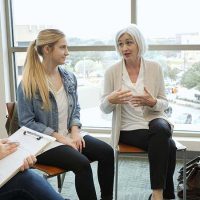March 4, 2021 by Dean Bellefeuille

It’s been a little over a year since the COVID-19 pandemic began; a year of fear, loneliness, and isolation for a great many older adults. Physical distancing has eliminated the ability to offer the comfort and warmth of a hug and even an in-person smile in many cases. Yet humans are social creatures, and this diminished socialization has many seniors turning online for connection – such as dating websites, which open them up to scams targeting seniors.
(more…)
February 23, 2021 by Dean Bellefeuille

With a great deal of negative news in the forefront of 2020, it is worth reflecting on a few of the remarkable achievements the year brought – including the advancements in dementia research. Katie McDonough, director of programs and services at the Alzheimer’s Association, shares, “There are many things that we’re learning and it’s an exciting time for Alzheimer’s research.”
(more…)
February 17, 2021 by Dean Bellefeuille

There are particular milestones we might experience in our lives that, though not necessarily negative, are known stressors. Losing a job. Starting a new job. Getting divorced. Getting married. And one that we in the home care industry are especially mindful of: the physical and mental impact on family members who are caring for aging parents.
(more…)
February 8, 2021 by Dean Bellefeuille

The fear and isolation as a result of COVID-19 has wreaked havoc on the wellbeing of older adults, with nearly half of seniors surveyed in a Kaiser Family Foundation poll stating that their amount of stress and worry was adversely affecting their own health. Even though it still may be hazardous to visit in person with senior loved ones, it’s important to stay in regular and frequent contact, and also to look for any signs or changes that may signify a mental health concern, such as elderly depression.
(more…)
January 20, 2021 by Dean Bellefeuille

It may have come completely without warning: an unexpected fall that led to a fractured hip as well as the requirement that Mom stay at home with extra support. Or, it may have been building up over time, such as through the slow and incremental progression of Alzheimer’s disease. Whatever the circumstances, you have now found yourself in the job of family caregiver, and maybe are wondering specifically what this means and just how to navigate these new waters. (more…)
January 18, 2021 by Dean Bellefeuille

It is way too easy to get swept up in the everyday tasks of caregiving for an older adult you adore. There is so much to be done, and often it’s just easier and a lot more efficient to do it all yourself, letting a loved one relax. After all, our elders have taken care of things for a lifetime; haven’t they earned a break? (more…)
January 15, 2021 by Dean Bellefeuille

Primary caregivers for those with Alzheimer’s disease are often all too experienced with the difficulty of trying to take a quiet moment or two alone – to use the bathroom, get a brief shower, or even walk into another room without your loved one becoming anxious. Those diagnosed with dementia can experience increased fear when a member of their family is out of sight – a condition known as dementia shadowing. And the resulting behaviors can be extremely challenging to manage: crying, anger and meanness, or continuously asking where you are. (more…)
December 22, 2020 by Dean Bellefeuille

“Sometimes you will never know the value of a moment until it becomes a memory.” – Dr. Seuss
Memories are the glue that bind together our past experiences with who we are today; and for someone with dementia, confusion around these memories can have a profound impact. One of our goals in caring for seniors with dementia is to help them hold onto and share memories in order to make sense of daily life. (more…)
December 17, 2020 by Dean Bellefeuille

In spite of its reputation for being a season of joy, for some seniors, the holidays are a time of profound sadness. Longing for holidays past, grief over the loss of loved ones, and aging-related changes to health can intensify during the holiday season, and it’s important to take steps to prevent the downward spiral into depression in older adults. (more…)
December 9, 2020 by Dean Bellefeuille

Think of the most perfect holiday season you can imagine. While that image may vary a bit for each of us, it might include gifts, lights, good food, and traditions passed down through the generations. Yet what most certainly rings true for all of us is the joy in spending the holidays with seniors and other family members we love. (more…)










